- Home
- Claudia Mills
The Totally Made-up Civil War Diary of Amanda MacLeish
The Totally Made-up Civil War Diary of Amanda MacLeish Read online
Table of Contents
Title Page
1
2
3
4
5
6
7
8
9
10
11
12
13
14
15
16
17
Also by Claudia Mills
Copyright Page
For Rowan Bensko
1
Only in our house, thought Amanda MacLeish, could a Friday night family Monopoly game turn into the Civil War.
Friday night was family night, according to Amanda’s mother. No sleepovers for Amanda and her best friend, Beth Gibson. No outings to the mall for Amanda’s eighth-grade sister, Steffi. No real estate e-mails for their mom. No jazz radio for their dad. They could play a board game, or take a walk, or watch a movie, if they could all agree on the movie.
Now Amanda wished they had taken a walk. Or agreed on a movie. But these days her family was having a hard time agreeing about anything.
“Your turn,” their dad said to Steffi.
Steffi picked up the dice. She had an infuriating way of rolling them, one at a time, jiggling each one in the palm of her hand for what felt like a whole minute before rolling it.
“Steffi, please,” their mother said.
“I need a seven so I’ll land on Reading Railroad. Then I’ll own all four railroads. The computer always buys all the railroads.”
With the first die, Steffi rolled a four. Then she jiggled the second die for an extra long time, as if that could make it roll a three.
She rolled a two.
“Great! Pay income tax.” She glared at Amanda as if it were her fault.
Amanda tried not to notice. Reading Railroad was her own favorite property, but not because she liked owning railroads. When she was younger, she had thought it was pronounced Reeding Railroad, like reading a book, not Redding Railroad, like the color red. It still seemed magical to her—a railway that could carry you away to the land of books, with stops at Oz, Wonderland, Narnia, Green Gables.
“At Tanya’s house, they have a family rule that nobody has to pay income tax or luxury tax,” Steffi said.
“Well, we don’t have that rule in our family,” their dad said.
“And at Tanya’s house, you get five hundred dollars for landing on Free Parking, and here you don’t get anything.”
“Just pay the tax,” their mother said. From her tone of voice, it sounded as if she was mad at Steffi, but Amanda knew better. She was mad at their dad, who already owned Boardwalk and Park Place, which meant that he would win, even though Steffi claimed that when she played Monopoly against the computer, the computer beat her without having Boardwalk or Park Place or even any of the green properties.
“Your turn, Amanda,” their dad said.
Amanda tossed down the dice quickly, as an example to Steffi. Unfortunately, she threw them down too hard and knocked over the lone, tiny green house her mother owned on Connecticut Avenue.
“Oops,” Amanda said.
Without a word, her mother replaced the house carefully, lining it up precisely in the exact corner of the house row, as if it was really important to collect $40 in rent if somebody landed on it.
“Four,” Amanda said. She assumed the roll still counted, even if it had caused a major housing calamity on Connecticut Avenue. “One, two, three, four.”
Now she was on Reading Railroad.
“Go ahead, buy it,” Steffi said. Amanda knew she meant, “Go ahead, ruin my chance of owning all four railroads, which is my new, best, computer-approved strategy for winning Monopoly.”
“I don’t want to,” Amanda said. It wasn’t Reading-a-Book Railroad. The only point in buying it, really, would be to spoil Steffi’s monopoly on railroads, and Amanda wasn’t in the mood for spoiling things any more than they were spoiled already.
“So you aren’t even going to try to win?” Steffi demanded.
“I don’t like owning railroads.”
Amanda looked at the two deeds she had so far. All she owned were Mediterranean Avenue and St. Charles Place—two other great names for properties. “Mediterranean” made her think of pink, flower-covered villas set beside a bright blue sea. “St. Charles” sounded medieval, as if he might have been friends with King Arthur or Robin Hood.
St. Charles was probably the patron saint of something. Amanda hoped it was writing. She couldn’t wait to have family night over with so she could go upstairs to her room and curl up in bed with her new notebook and start writing her first Civil War diary entry for Mr. Abrams.
It might be strange to want to do homework on a Friday night, but Mr. Abrams had thought up a great assignment. Every student in Amanda’s fifth-grade class had been given the identity of some Civil War person, real or fictional, and had to spend a month writing that person’s diary. Amanda was supposed to be ten-year-old Polly Mason from Frederick, Maryland, whose brothers were fighting against each other, one for the North and one for the South.
“So you aren’t going to buy the railroad?” her father asked. At least when he asked a question, it was just a question.
Amanda shook her head. According to the rules, an unclaimed property was supposed to be auctioned off, but Amanda’s family never played that way.
“Okay, my turn,” her father said. He scooped up the dice and shook them heartily in both cupped hands, then flung them down on the board with an eager grin. He always seemed to be expecting something wonderful to happen.
“Eight!” He drove his little car token across eight squares, giving one friendly toot as he passed their mother’s top hat token.
Amanda giggled, but nobody else did. Steffi rolled her eyes. Their mother gave a tongue click of annoyance.
“Oh, boy!” He had landed on Marvin Gardens, the only yellow property he didn’t yet own. His face lit up as he reached for his stack of hundred-dollar bills. He was always the one who got “LIFE INSURANCE MATURES—COLLECT $100” in Community Chest.
“One deed for Marvin Gardens,” he said to Steffi. Steffi was the banker, to Amanda’s enormous relief. Amanda hated it when people yelled at her for not being able to subtract 280 from 300 in her head.
“And wait a minute, I’ll take three houses for them.” He already had one house each on Boardwalk and Park Place.
Amanda’s mother straightened her own house on Connecticut Avenue again. It had gotten crooked after the last exuberant dice roll.
“I’ll take two more houses, too,” she said stiffly.
But houses on the yellow properties were a lot scarier than houses on the light blue properties. Amanda wished her mother would land on the last unowned green property. Then she’d have a real chance to win. It would be okay if her mother lost to her, or to Steffi. But Amanda didn’t know what would happen if her mother lost to her father.
“Your turn,” Amanda’s father said to Amanda’s mother.
“I know it’s my turn.”
She rolled the dice and landed on “GO TO JAIL.” Amanda and Steffi used to make a big fuss if somebody had to go to jail. “Criminal!” they’d taunt. “What’d you do this time?” “Have fun in the slammer!” They didn’t say anything now.
“Most wives and mothers I know think jail sounds pretty appealing,” their mother said. “Peaceful, quiet cell. Three meals a day cooked by somebody else. Nobody else’s jazz station turned up too loud. Nobody else’s shirts to iron.”
“I thought you had to make license plates,” Steffi said. She had always been the braver sister.
“I’d like to make license plates. It sounds utterly mindless and straightforward. Put a rectangle of metal in the stamper. Stamp it. I could do that.”
Going to jail had definitely put her in a better mood. Amanda liked jail, too, at least in the second half of a Monopoly game, when every move could land you on someone else’s fabulously expensive space with a hotel. She always hoped she wouldn’t roll the doubles that would open up the barred doors of the jail cell and let her go free.
In real life, she wouldn’t mind jail if she could curl up on her bare little cot with a pad of paper and pen for writing. A book written by a ten-year-old from her jail cell was bound to get published. Maybe she could even publish her Civil War diary if it was good enough. There were always tons of historical diary books in the book fair at school.
The game went on. Steffi got the Chance card that said “TAKE A RIDE ON THE READING,” so she finally got to buy it.
Amanda collected ten dollars from a Community Chest card for winning second prize in a beauty contest. Ha! The judges must have liked mousy brown hair, plain old brown eyes, and lots of brown freckles. Amanda planned to give Polly Mason, her Civil War character, long, golden curls and luminous blue eyes that reflected the cloudless blue sky above her rough-hewn log cabin.
Twice their father passed Go and put more houses on Park Place and Boardwalk. Their mother stayed peacefully in jail. Maybe the MacLeish family could play Monopoly after all.
Then their mother got out of jail.
Two turns later, Steffi landed on Park Place with three houses and had to pay $1,100.
“It’s stupid to make some properties worth that much more than all the others,” she said.
“That’s life,” their father replied cheerfully as he took her rent money and promptly bought two more houses with it.
“Monopoly is not like life,” Steffi snapped. “In life you don’t roll little numbered dice to find out what’s going to happen to you. In life you don’t draw little cards out of piles and do whatever the cards say to do.”
“You have a point there,” he agreed.
Steffi scowled. Amanda could tell she had been looking forward to an argument, but their dad never argued. His even temper was one of the things that drove their mother crazy.
Amanda landed on a railroad and had to pay $200 now that Steffi owned all four. Their father put hotels on Boardwalk and Park Place.
Their mother picked up the dice. She had reached her own Pacific Avenue. Amanda watched her nervously. If she rolled a six, she’d land on Park Place. If she rolled an eight, she’d land on Boardwalk. If she rolled anything else, she would be okay, though it would be slightly annoying to roll a seven and land on Luxury Tax.
Amanda wished she had a magic dice-rolling spell. “Not six, not eight,” she beamed toward the dice, hidden in her mother’s hand. Everything would be all right for the rest of their lives if her mother just didn’t roll a six or an eight.
She rolled an eight.
Amanda’s eyes met Steffi’s. For the first time, Amanda knew that there was really something wrong with their family. In Beth’s family, in normal families, it wasn’t the end of the world if the mother landed on the father’s Boardwalk with a hotel. In Beth’s family, in normal families, the mother didn’t say that she wished she were serving time in jail, and mean it.
Their mother moved her top hat eight squares to Boardwalk.
“Let’s see … Boardwalk with hotel … That’ll be two thousand dollars,” said their father.
“I don’t have two thousand dollars.”
“You can mortgage your properties,” their father suggested, as if he were a neutral financial counselor just trying to give helpful advice.
“You win.” Her eyes glistened with tears. Amanda knew she wanted to say, “Just like you always win everything.” But she didn’t say it.
“Um—is family time, like, over?” Steffi asked hopefully.
Her mother was already putting the Community Chest and Chance cards back in the box.
Their father nodded. He didn’t look happy anymore about winning. Further proof that Steffi was right: Monopoly wasn’t like real life. You could win at Monopoly and still end up the loser.
Amanda hastily gathered up the property deeds, not bothering to put them in the proper order. She had a feeling her family wasn’t going to be playing Monopoly together anytime soon. Then she fled upstairs, where a brand-new spiral notebook and freshly sharpened pencil were waiting.
April 2,1861
Dear Diary,
Mother and Father gave you to me today for my tenth birthday present, and I am going to start writing in you right now. I hope we will become good friends. I will tell you everything. I wish you could tell me things, too. It will be strange to have a friendship where one friend does all the talking and the other friend does all the listening. Though that’s how I feel sometimes with my friend Betsy. She talks twice as much as I do. At school Master Taylor made her write on the blackboard one hundred times, “I will not talk to Polly.”
I am Polly. My full name is Polly Jane Mason.
Because we are just getting to know each other, I will tell you some things about me. I have golden curls that take a long time to brush in the morning. Mother tells me I should not be vain about them, but sometimes I can’t help it. I am so glad my hair is not mousy brown like Betsy’s. My eyes are blue. I have no freckles at all. Mother is always telling me that if I don’t wear my sunbonnet I’ll get freckles, but I hardly ever remember to wear it and I don’t have any freckles, anyway. Betsy wears her sunbonnet all the time, and she has more freckles than I can count.
There are five people in my family—five human people, plus one dog named Shep and two cats named Blackie and Whitie. Besides me, the other people are Mother, Father, Thomas, and Jeb.
Thomas is nineteen. He is so much older than I am that sometimes he forgets he is just a brother and tries to order me around as Mother and Father do. “Polly, go get the eggs from the barn.” “Polly, go milk the cows.” He treats me practically like a slave, which is strange, because Thomas thinks slavery is wrong and evil and an abomination in the eyes of the Lord.
Jeb is fifteen. He is a lot older than I am, too, but he still likes to go sledding with me in the winter and catch fireflies with me in the summer. He says that slavery is not so bad. He says most slaves couldn’t take care of themselves if they didn’t have owners to look after them. Jeb says the North shouldn’t tell the South it can’t have slaves. The one thing Jeb hates most in the world is if anybody tells him what to do, especially Thomas. He and Thomas fight all the time.
I agree with Thomas that slavery is wrong. How could it be right for one human being to own another human being? But I agree with jeb that the North shouldn’t tell the South what to do. It’s confusing to agree with both brothers when they never agree with each other.
I love both my brothers, but down deep I love Jeb more. Is that a terrible thing to say, dear Diary? You must promise not to tell anybody else the secrets I tell you!
The South has seceded now and wants to be its own country, called the Confederacy. Part of me thinks that’s okay. Why shouldn’t it be separate if it wants to? But part of me feels sad. A country is kind of like a family. Even if you don’t agree about things, you should still stay together.
I hope that Mother and Father and Thomas and Jeb and Shep and Blackie and Whitie and I will be together forever.
2
“Is anyone willing to share his or her first diary entry?” Mr. Abrams asked the class Monday morning. They were all seated cross-legged on the brightly patterned carpet by his comfy-looking rocker in their classroom gathering place.
Sitting next to Amanda, Beth shook her head emphatically. “Mine is terrible!” she whispered to Amanda. “I’m supposed to be the wife of a Confederate soldier who dies in the Battle of Bull Run. But I can’t think of anything for my characters to say that doesn’t sound lovey-dovey and stupid. ‘I hope you don’t die
in battle, my darling!’ ‘I hope so, too, my love!’”
Amanda giggled, even as she felt a stab of pity for the young wife, soon to be a young widow. Maybe with a baby on the way, a son, never to know his brave soldier father.
“Anybody?” Mr. Abrams asked gently, after a long pause.
Amanda felt his eyes on her. He knew how much she loved to write. Usually Amanda was the first to volunteer to share her poems and stories. That was part of the point of writing them, so that somebody else could read them and think, Yes! I’ve felt that way, too. But her diary entry felt so private. Hadn’t Polly explicitly told her diary never to reveal the secrets written there? Would Polly want Amanda’s whole fifth-grade class to know that she loved her brother Jeb more than she loved her brother Thomas?
Of course, Polly and Jeb and Thomas weren’t real, Amanda reminded herself. It wasn’t wrong to betray the innermost secrets of made-up people, was it?
She wasn’t willing to raise her hand, but she gave a tiny nod, and Mr. Abrams’s middle-aged face creased into a grateful smile.
“Amanda! Thank you! All right, everybody,” he said to the rest of the class, looking directly at Ricky and Lance, who had started a thumb-wrestling match over in the corner. “Let’s all listen to Amanda’s diary entry.”
Ricky’s thumb came down triumphantly on Lance’s. Lance gave Ricky a half-congratulatory, half-retaliatory whack on the shoulder. Then the boys turned toward Amanda. The kids in the class usually did what Mr. Abrams said. He expected everyone to be kind and courteous, so even kids like Ricky and Lance tried to act that way.
Amanda felt shy as she started to read, in a low, clear voice, but when she read the line about Betsy’s freckles, the others laughed. They like it, she thought. As she read aloud about Jeb and Thomas, they seemed even more real to her than when she was writing about them.
“‘I hope that Mother and Father and Thomas and Jeb and Shep and Blackie and Whitie and I will be together forever.’”
Beth started clapping, and then everyone else was clapping, too.
“Amanda, that was wonderful!” Behind his thick glasses, Mr. Abrams’s eyes shone. “Class, what did you like best about Amanda’s diary?”

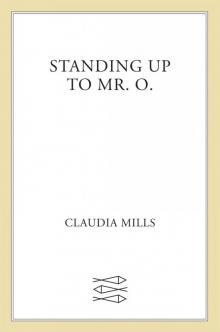 Standing Up to Mr. O.
Standing Up to Mr. O.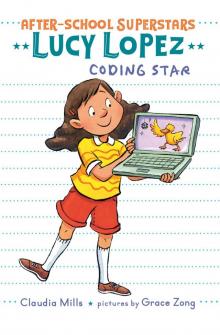 Lucy Lopez
Lucy Lopez Dinah Forever
Dinah Forever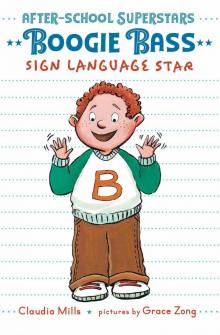 Boogie Bass, Sign Language Star
Boogie Bass, Sign Language Star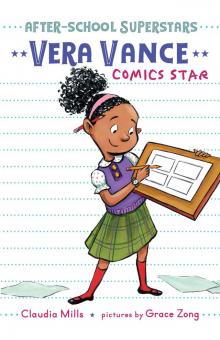 Vera Vance: Comics Star
Vera Vance: Comics Star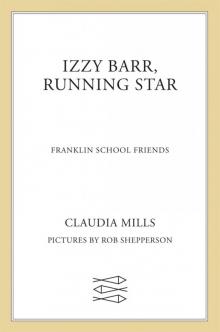 Izzy Barr, Running Star
Izzy Barr, Running Star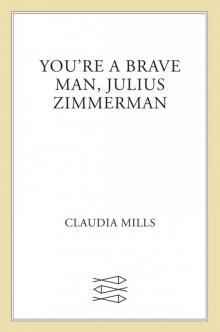 You're a Brave Man, Julius Zimmerman
You're a Brave Man, Julius Zimmerman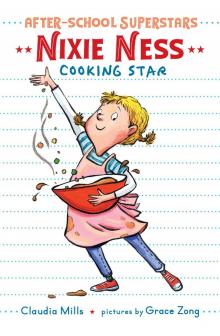 Nixie Ness
Nixie Ness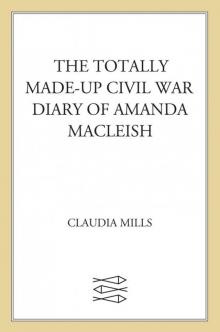 The Totally Made-up Civil War Diary of Amanda MacLeish
The Totally Made-up Civil War Diary of Amanda MacLeish Basketball Disasters
Basketball Disasters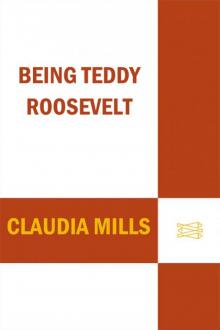 Being Teddy Roosevelt
Being Teddy Roosevelt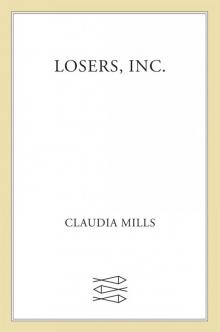 Losers, Inc.
Losers, Inc.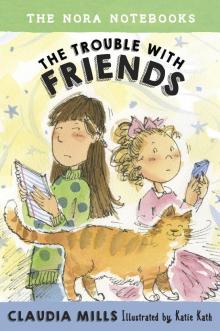 The Trouble with Friends
The Trouble with Friends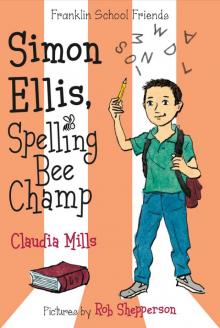 Simon Ellis, Spelling Bee Champ
Simon Ellis, Spelling Bee Champ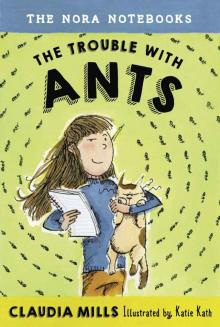 The Nora Notebooks, Book 1: The Trouble with Ants
The Nora Notebooks, Book 1: The Trouble with Ants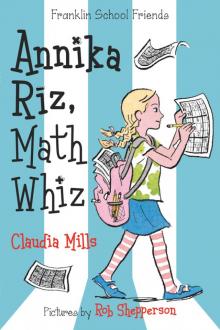 Annika Riz, Math Whiz
Annika Riz, Math Whiz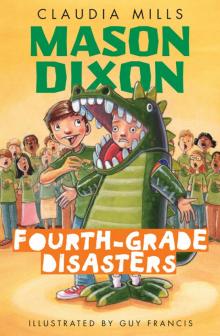 Fourth-Grade Disasters
Fourth-Grade Disasters Pet Disasters
Pet Disasters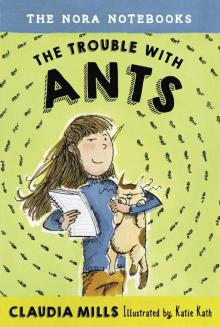 The Trouble with Ants
The Trouble with Ants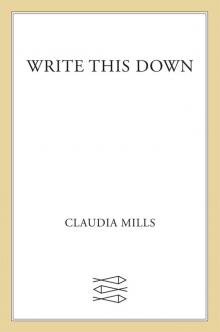 Write This Down
Write This Down Alex Ryan, Stop That!
Alex Ryan, Stop That!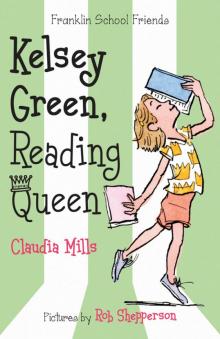 Kelsey Green, Reading Queen
Kelsey Green, Reading Queen How Oliver Olson Changed the World
How Oliver Olson Changed the World Lizzie At Last
Lizzie At Last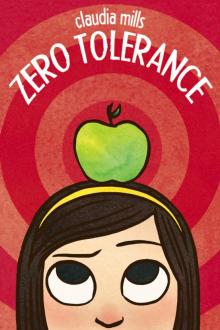 Zero Tolerance
Zero Tolerance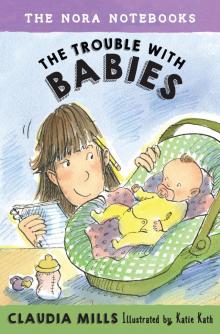 The Nora Notebooks, Book 2
The Nora Notebooks, Book 2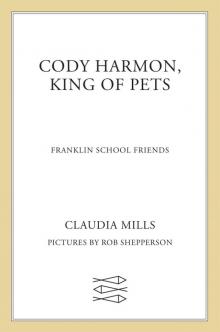 Cody Harmon, King of Pets
Cody Harmon, King of Pets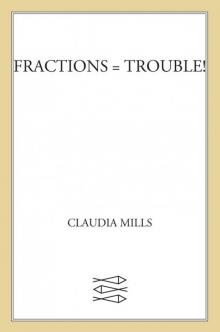 Fractions = Trouble!
Fractions = Trouble!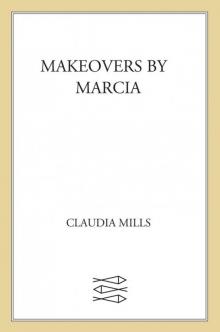 Makeovers by Marcia
Makeovers by Marcia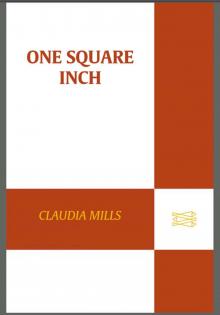 One Square Inch
One Square Inch